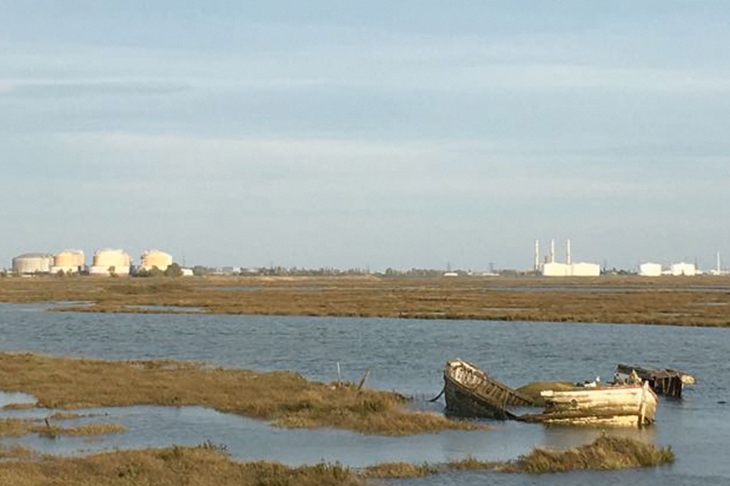Perched on the edge of the Medway about 15 miles from Rochester is the Isle of Grain, a mass of wild marshes and pastures and great industrial infrastructure. Redshanks, curlews and egrets circle and dive around turbines, tunnels and tanks. The enormous chimney of the gas turbine power station stretches up into the enormous sky.
In 1629, Thomas Johnson, the father of British botany, came to Grain and wrote of its bleakness. ‘Seeing nothing which could afford us any pleasure,’ he wrote, despairingly, ‘there was not a village near, nor the smoke of a chimney in sight, nor the barking of a dog, those usual signs of inhabitants, to raise our languid minds to any kind of hope.’
Grain was still ‘wild and unexplored’ when Joseph Conrad wrote about the place in his autobiography, The Mirror of the Sea. Now, though, there is a protected bird sanctuary and plenty of grazing cattle. At Thames-port, container ships are unloaded by automated gantry cranes; the Grain liquefied natural gas import facility is a 600-acre site of Brutalist architecture; and Amazon has a 34,000 sq metre warehouse here.
Despite its proximity to London, Grain remains distinctly underpopulated. The vast sky stretches over the flat marshes and the turbines and the chimneys and the warehouses. On this blustery autumn day, it is an awesome sight, blue and bright with the sunshine bouncing off the Medway river and glinting in all the lakes and pools and rivulets. We walked along the causeway, shouting at each other over the wind and under electricity pylons that sizzled with the sound of frying eggs. We lay on the banks of a stream and looked up through the bulrushes at the clouds and the steam from the power station.








Comments
Join the debate for just £1 a month
Be part of the conversation with other Spectator readers by getting your first three months for £3.
UNLOCK ACCESS Just £1 a monthAlready a subscriber? Log in